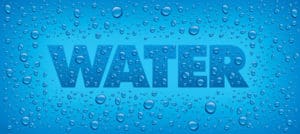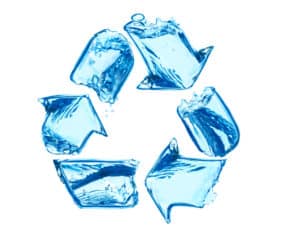We like to share product recommendations with you and hope you like them! Just to make you aware Water Filter Data may collect a small share of sales or other compensation from the links on this page.
Wherever water flows, there is life. It’s essential for our existence. But as the human population increases, so does the need for water.
Human activities directly affect the water quantity available to us, and it’s decreasing rapidly. We need to learn to use water more consciously.
Different parts of the world already have drinking water deficiency, so what can we do to change that?
Do we really need all the water we use daily?
How much water do we use daily?
It’s normal that water is used for a number of household activities, like flushing the toilet, washing dishes, and clothes, cooking, watering the garden, etc. But most of the time, more water than needed is used for these actions.
The average person uses about 100 gallons of water per day, and only 13 to 15 of those are for drinking and cleaning. What happens with the other 85 gallons? Do everyday household activities use up that much water?

Let’s take a closer look at approximately how much water is used for each action.
- Shaving: 1 gallon
- Hand washing: 1 gallon
- Teeth brushing: up to a gallon
- Shower: approximately 2 gallons per minute
- Bath: for a full tub – about 36 gallons
- Dishwasher: 4 to 10 gallons
- Dishwashing by hand: up to 20 gallons
- Laundry: 25 gallons per load
- Toilet: up to 4 gallons
- Garden: 5 to 10 gallons per minute
As you can see, some of these do use a lot of water, but we don’t need to do all these actions every day, so we can always cut back on some of them in order to save some water.
People think of water as a never-ending source, but that’s not exactly the truth. With more and more things we use it for and the climate change happening right now, we could be looking at a water shortage in the near future.
Why do we need water?
Our bodies are 60% water, so it’s not surprising that water has so many benefits for us. We need it for most processes that occur in our body daily. It helps the organs function normally and helps our overall health.
Benefits
Normal body temperature
During different activities, our body temperature increases. With drinking enough water, we enable our sweat glands to produce enough sweat, which comes to the surface of the skin and then evaporates, cooling the body and helping it preserve normal temperature.
Protecting body tissue
When the body has enough water, it produces moisture which is good for a number of tissues in the body, also in blood and bones.
Helps eliminate waste
Enough water intake helps your body detox. It filters out the blood vessels, helping them stay clean, and also assists the kidneys to remove waste.
Brain function
Low levels of water in your system can significantly impair the work of your brain. A lot of studies show that people who don’t consume enough water suffer from mood swings and a lack of concentration.
Risks
Although water helps improve every aspect of our health, it’s important to know how much to consume for optimal function. Too little or too much water can cause a series of problems in our system.
Dehydration
When the loss of water is bigger than the intake, the body experiences dehydration, which is very serious. If not ingested enough, the lack of it causes dizziness, headaches, and kidney failure. This can easily be fixed with rehydrating, but if the dehydration lasts for a long period of time, it can cause long-term damage.
Overhydration (Hyponatremia)
Just as low water intake is not good, drinking too much can cause the same problems. Consuming large amounts of water constantly can lead to the same issues, causing dizziness and headaches. It also affects the kidneys because they can’t process that much water. In other words, they can’t get rid of it.
Tip: If your household experiences a lack of quality drinking water, it’s a good idea to buy a water filter. You can learn more about this here.
Actual water use
Apart from the water that we drink, a lot of water is used (a lot of it wasted) during everyday activities around the home.
If you ask most people, they don’t even know how much water they use daily. They tend to think that they use a lot less water than they actually do.
An example of this is not thinking about the water that is wasted during those long hot showers which we all enjoy. We don’t use this water for our benefit, it actually just flows in the drain and that is wasted water.
How to save water?
Because water is a priceless resource, mankind has started thinking of ways to preserve it. There are a number of things you can do to help with this issue.

Toilet
Toilet flushing is the most repeated action in a household. We can’t really influence our body’s needs but we can control the water waste in a different way. You can install the newer versions of toilets which use a lot less water when flushing. It may be a little expensive, but it’s a long-term investment that will surely cut down your water bills.
Clothes washer
Every load of clothes in the washer uses about 36 gallons! That’s a lot of water that can be used for a number of other things. We’re not saying to stop washing your clothes, but same as with toilets, there are certified high-efficiency washers that use a significantly lower amount of water.
Shower
The duration of showers directly affects the amount of water usage. To help minimize it, it’s a good idea to try and take shorter showers, and also maybe investing in specially designed showerheads that limit the use of water to 2 gallons per minute.
Leaks
Maybe it doesn’t look like a serious problem, but constant leaks, no matter how small they are, can increase your water usage significantly. To resolve this, check your faucets and water heaters regularly. For less visible leaks, you can use a water meter.
Even governments have become aware of this water-wasting problem. A lot of them have restricted the amount of water that can be used in households. This is a smart move and a huge step towards water preservation.
Conclusion
It’s important to know the use of water in your own home and control it for the benefit of your family and the overall population. If we all contribute a little, we can look after our biggest natural gift and enjoy its benefits for years and years to come.

Wayne is a water quality expert – The founder of Water Filter Data. He has a degree in microbiology and his field of expertise is drinking water. His goal is to allow for clean and healthy water for as many people as possible.



